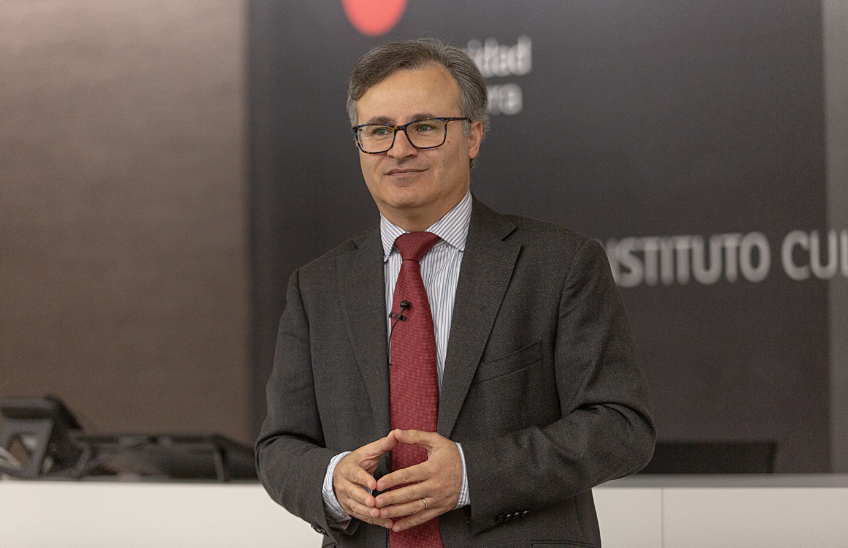2022_07-01 Restructuring Course Law
Ibon Hualde, Full Professor: "The reform of the Insolvency Law creates the figure of the expert who has to attend the debtor and the creditors during the whole negotiation process".
The University's Law Department School is promoting a Specialist Course in Corporate Restructuring, from update in accordance with the bankruptcy reform.

FotoManuelCastells/Ibon Hualde, Full Professor of the School of Law of the University of Navarra.
01 | 07 | 2022
Preventive restructuring and restructuring budgets; economic-financial aspects of restructuring, the new concept of preconcurso and restructuring plans, the restructuring expert, specialities in SMEs and micro-companies. These are some of the topics included in the programme of training higher Specialist in Business Restructuring that will be promoted by the School of Law of the University of Navarra. "This course responds to the needs derived from the bankruptcy reform carried out in our country for the transposition of the EU Directive of 20 June 2019, on restructuring and insolvency, and approved yesterday by the plenary session of the Executive Council of the congress, the same day that the bankruptcy moratoriumended", points out the professor of the School of Law of the University of Navarra, Ibon Hualde.
"The reform creates the figure of the expert in corporate restructuring, who has to attend the debtor and creditors throughout the negotiation process between both parties, and must have legal, technical and financial knowledge," continues Hualde, co-director of the program, along with José Carlos González, Senior Associate Professor of Commercial Law of the UCM and partner director of area Restructuring and Insolvency of Ceca Magán Abogados.
The keys to bankruptcy reform
Among the main novelties included in the reform of the Insolvency Act, Professor Hualde mentions the following six. Firstly, the so-called restructuring plans are introduced , legally defined as a pre-bankruptcy instrument "aimed at avoiding insolvency, or overcoming it, which enables action to be taken at a stage of difficulties prior to that of the current pre-bankruptcy instruments, without the stigma associated with bankruptcy and with characteristics that increase their effectiveness"; and, at the same time, the current refinancing agreements and out-of-court payment agreements are eliminated.
entrance is given in the insolvency regulation to the expert in business restructuring; a new budget goal is added to current and imminent insolvency for the initiation of a restructuring plan consisting of the likelihood of insolvency; deadline is extended to the so-called "preconcurso", which is a mechanism that grants the debtor a period of three months, now extendable for a further three months, starting from the communication made by the debtor to the commercial court, to negotiate with creditors and achieve a restructuring plan that will enable the debtor to overcome its difficulties and avoid insolvency status .
In addition, the instrument known in the forensic internship as "pre-pack concursal" is expressly regulated, which is an accelerated pre-bankruptcy procedure for the realisation of production units that allows their sale to be prepared in the phase prior to the declaration of bankruptcy; and, lastly, a special procedure is envisaged for micro-companies, which is carried out in an abbreviated manner by means of standardised electronic forms accessible online and free of charge, which are sent electronically, eliminating all unnecessary procedures and reducing the involvement of professionals and institutions to the minimum necessary.
Full Professor of Procedural Law, Ibon Hualde considers that the Insolvency Law has shown, since its beginnings and in spite of the multiple reforms it has undergone, "incapable of remedying in time the status of heavily indebted companies and in status of illiquidity. In reality, insolvency proceedings continue to be a way of burying companies in crisis through the liquidation solution. The EU Directive stresses the need to seek procedures that help viable companies in financial difficulties to restructure their debt, without having to go into insolvency proceedings and, of course, without having to go out of business," he explains.
Ibon Hualde stresses that the goal of the course is for the student body to "immerse in the knowledge of the new rules on companyrestructuring, to acquire the practical skills necessary for the exercise of the position of restructuring; and to properly understand the economic and financial coordinates that allow the restructuring of the financial status of companies in crisis". The programme is aimed at legal professionals, economists and business advisors, with an interest in specialising or retraining in the field of insolvency area . It will be held from October at campus of the University of Navarra in Madrid.





